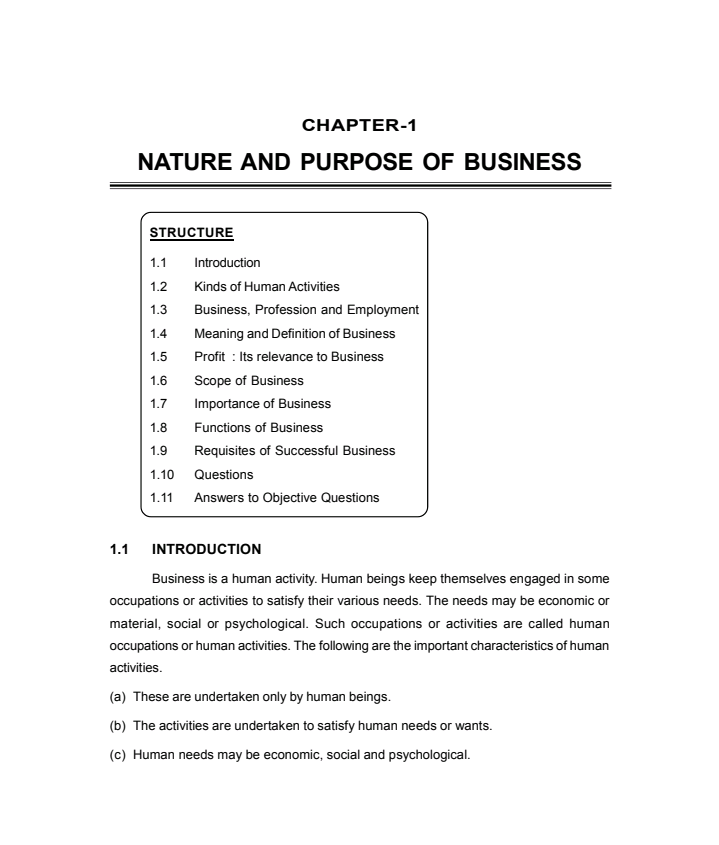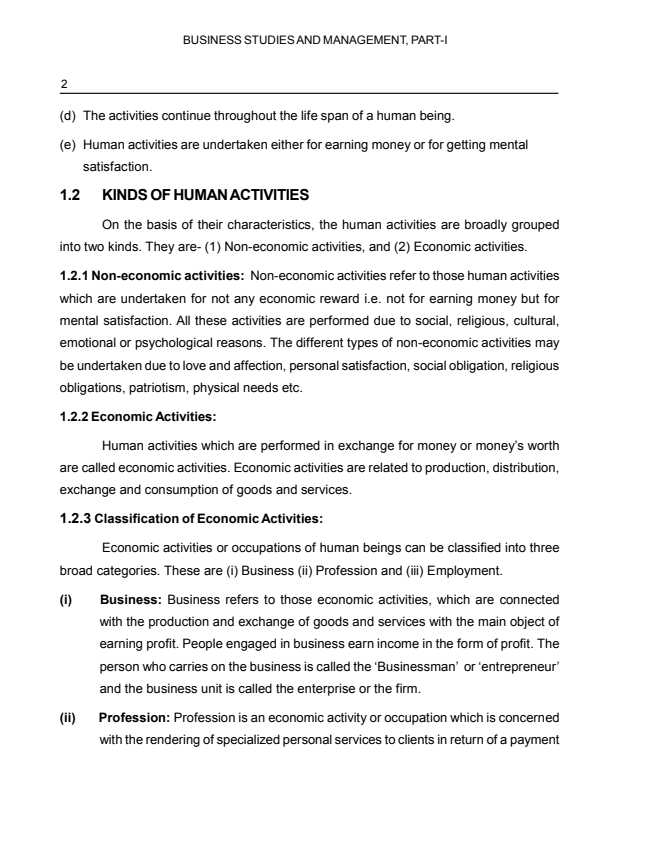Understanding Business: Nature, Purpose, and Human Activities
NATURE AND PURPOSE OF BUSINESS

1. Introduction
- Business as a Human Activity:
- Business is fundamentally about human engagement and societal function. It involves individuals or groups participating in various tasks aimed at meeting specific needs.
- Understanding human activities' motivation can help entrepreneurs align their business goals with customer satisfaction.
2. Kinds of Human Activities
- Economic, Social, and Psychological Needs:
- Activities can be categorized based on the type of needs they fulfill. Economic activities are those that generate income, while social activities are more community-focused, and psychological activities cater to emotional or mental well-being.
3. Business, Profession, and Employment
- Distinctions Among Concepts:
- Business refers to the trade of goods and services for profit, a profession is typically a service rendered requiring specialized education, and employment is about being hired to assist businesses or professionals in their operations.
4. Meaning and Definition of Business
- Defining Business:
- A clear definition of business helps set the framework for how organizations operate. This includes understanding various models and strategies that suit a business's nature and goals.
5. Profit: Its Relevance to Business
- Profit as a Key Goal:
- Profit serves as a fundamental indicator of a business's success and viability. It's critical in assessing performance and strategizing for future growth.
6. Scope of Business
- Variety of Business Activities:
- The scope of business is vast and includes producing goods, providing services, and retailing products. Each area requires different strategies and approaches to manage effectively.
7. Importance of Business
- Contributions to Society:
- Businesses play a crucial role in economic development, job creation, and improving living standards. They also contribute to societal needs by producing goods and services.
8. Functions of Business
- Core Functions:
- Main business functions include marketing, finance, human resources, and operations. Each function needs to work synchronously to achieve the overall objectives of the business.
9. Requisites of Successful Business
- Ingredients for Success:
- Success in business often depends on effective planning, management skills, adequate capital, and market knowledge. It is essential to adapt to changing market conditions to sustain business growth.
10. Questions
- Reflective Queries:
- Consider questions that stimulate critical thinking about how businesses can effectively meet human needs and adapt to societal changes.
11. Answers to Objective Questions
- Assessment of Understanding:
- Closing the chapter with objective questions encourages learners to reflect on their understanding of the topics discussed, solidifying their knowledge and application in real-world scenarios.
Reference:
rgbaruahcollege.ac.in
[PDF] Unit-1 Nature and Scope of Business Questions - RG Baruah College
www.hks.harvard.edu
[PDF] The Role of Business in Society: An Agenda for Action
www.toppr.com
Objectives of Business: Economic and Social, Concepts and Examples
Notes on Human Activities and Economic Activities

Introduction to Human Activities
- Human activities can be broadly classified into two types: Non-economic activities and Economic activities.
- This categorization helps understand the motivations behind various activities people engage in, whether for personal satisfaction or monetary gain.
Kinds of Human Activities
1. Non-economic Activities
- Definition: Activities undertaken not for economic rewards, such as money.
- Purpose: Focus on mental satisfaction, emotional fulfillment, or social obligations.
- Examples:
- Activities done out of love and affection (e.g., volunteering).
- Personal satisfaction pursuits (e.g., hobbies).
- Religious obligations (e.g., participating in community service).
- Thoughts: Non-economic activities can significantly enhance personal well-being and societal cohesion, as they often promote altruism and community engagement.
2. Economic Activities
- Definition: Activities performed in exchange for money or equivalent value.
- Characteristics: Related to the production, distribution, exchange, and consumption of goods and services.
- Importance: These activities are central to economic development and sustainability, shaping job markets and resource allocation.
Classification of Economic Activities
| Category | Description |
|---|---|
| Business | Economic activities related to production and exchange of goods/services aimed at earning profit. People involved are called 'businessmen' or 'entrepreneurs'. |
| Profession | Specialized occupations providing services to clients in return for payment, requiring specific skills or training. |
| Employment | Work for an employer in return for wages or salary, contributing to business functions and economic growth. |
1. Business
- Role: Connects production and exchange of goods/services with profit as a primary goal.
- Key Players: Businessmen and entrepreneurs who operate within various sectors.
- Thoughts: Businesses not only drive economic activity but also create jobs and stimulate innovation.
2. Profession
- Nature: Focused on specialized services, often requiring qualifications and expertise.
- Examples: Doctors, lawyers, and consultants.
- Thoughts: Professions serve critical societal functions, emphasizing ethics, standards, and service quality.
3. Employment
- Definition: Involves working under someone else's direction for agreed compensation.
- Significance: Essential for sustaining economic growth and stability.
- Thoughts: Employment not only benefits individuals through income but provides essential functions that help businesses operate effectively.
Conclusion
Understanding the distinctions and purposes of human activities is crucial for grasping the broader economic framework within which businesses operate. This knowledge highlights the impact of various activities on personal fulfillment and societal advancement.
Reference:
economics.yale.edu
Can Google Search Data Predict Economic Activity? Google Chief ...
www.toppr.com
What are Economic Activities?: Characteristics, Examples and Videos
study.com
How Human Activity Affects the Development of Economic Systems